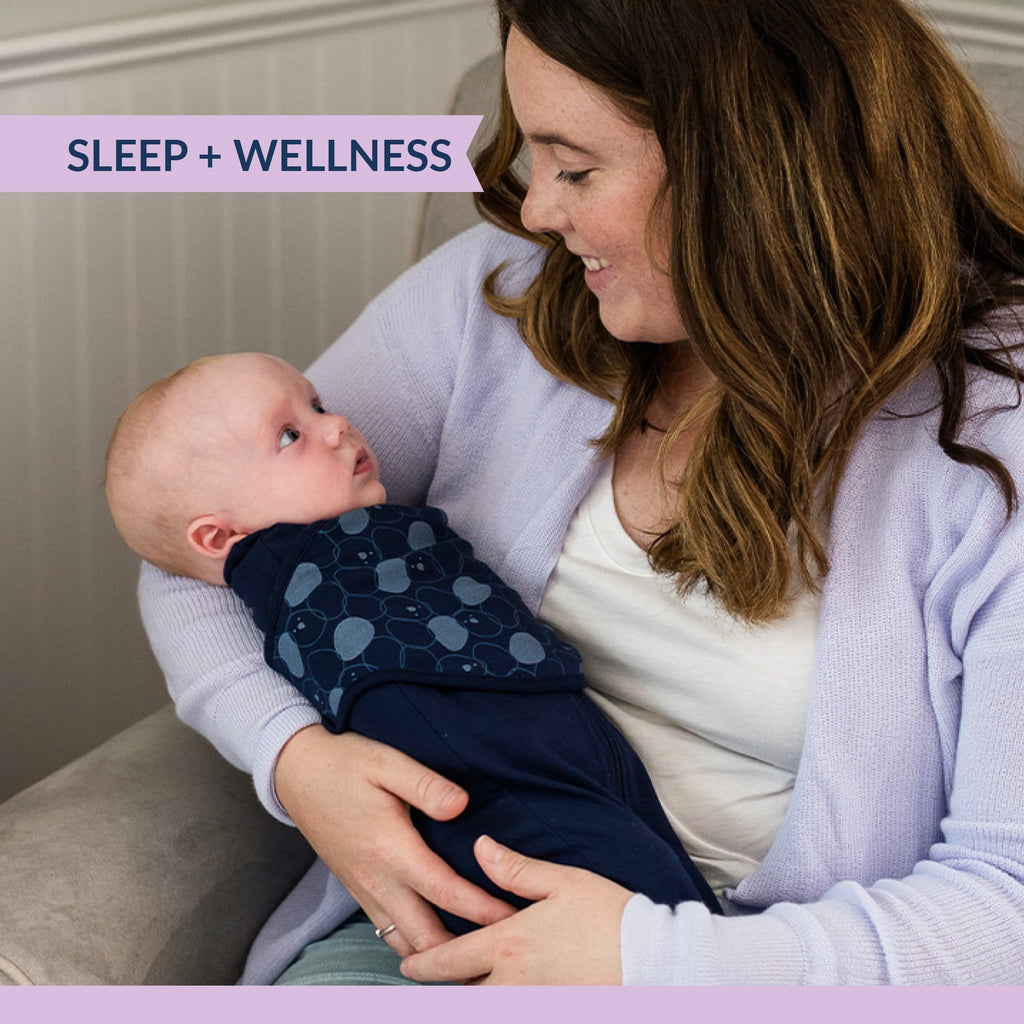The joy of bringing your baby home to a nursery you spent months making just perfect is really exciting! I know firsthand the magical feeling of cradling their sweet little head in your arms, rocking and swaying them to sleep. Those memories I will cherish forever.
Then I laid her down in her carefully-researched, highly recommended bassinet and the whole neighborhood knew: she was not having it.
Despite my best efforts, there was absolutely no way my baby was going to sleep in a bassinet. Naturally, the early magical snuggles turned into severe sleep deprivation and I knew this wasn’t sustainable long-term. The entire household desperately needed sleep. Real, rejuvenating sleep.
Fortunately, I discovered a series of helpful tips on getting newborn to sleep in bassinet – and I’m going to let you in on the secrets of how to get baby to sleep in bassinet if your child is currently refusing to do so.
We’ll talk about the importance of baby sleeping in a bassinet, potential reasons why your newborn won’t sleep in bassinet, and share solutions (hooray) so you can finally catch those zzz’s.
What is a bassinet?
A bassinet is a compact, portable baby bed designed for infants from birth up to a few months old. It provides a cozy, snug environment that mimics the womb, offering comfort and security to newborns.
Typically placed beside the parent’s bed, bassinets facilitate easier nighttime feedings and soothing, allowing for quick response to a baby’s needs without the necessity of walking to a separate nursery.
Many bassinets come with a variety of features such as a rocking or gliding mechanism, built-in music or vibration settings, and some even have attached mobiles or storage pockets for essentials. It’s essential to ensure that the bassinet meets safety standards, with a firm mattress and breathable sides.
The compact size and lower height of bassinets make them a popular choice for parents looking to maintain close proximity to their newborns during the early stages of development.
Why learning how to get baby to sleep in bassinet is so important

Before we walk you through how to get baby to sleep in bassinet, let’s talk about why this matters in the first place. Helping newborn sleep in bassinet is essential because it is safe and empowers them develop healthy, sustainable sleep habits.
Safety
The American Academy of Pediatrics recommends that parents put their baby down to sleep in a crib, cradle or bassinet with a firm mattress covered only by a fitted sheet: No soft blankets, pillows or stuffed animals.
The AAP also recommends that babies share a room with mom and dad – but not the same bed – for at least six months. Safe cosleeping with baby is only possible after that developmental milestone.
Sleep habits
Babies are used to the rocking motion of the womb which explains why they don’t want to be alone. They prefer having you close by, for comfort and security.
However, some babies will become so accustomed to sleeping in their parent’s arms that they don’t know how to fall asleep when placed on their own into the bassinet. If your newborn won’t sleep unless held, don’t worry – we’ll share tips for getting baby to sleep in bassinet in just a moment!
Sleep deprivation
The National Sleep Foundation (NSF) reports that only 10% of new parents get adequate rest each night. This is due in large part to either baby being up crying, nursing or you’re lying awake worrying.
Sleep deprivation puts new parents at risk for developing anxiety, postpartum depression and…mommy brain (that actually explains a lot.)
Newborn won’t sleep in bassinet: Most common causes for baby refusing to sleep in bassinet
Because babies can’t verbally express what’s wrong, relying on the different baby cries is essential. Often, what’s upsetting them is unrelated to the bassinet itself. Here are five possible causes why your newborn won’t sleep in bassinet.
Seeking Comfort
Your baby may be experiencing reflux or gas, which will give them trouble while laying on their back. This explains why when you lay them in the bassinet, the shrill siren sounds.
A comfortable baby is a happy baby. When getting your little one to sleep in a bassinet, you want to make sure they’re as comfortable as possible. A big part of that is creating a cozy sleeping space in their bassinet. – Wonder Baby
Note: A little gas and spit up is to be expected as your baby’s digestive system is learning the works. But, we encourage you to speak with your physician about safe sleeping options if you suspect your baby is experiencing colic or reflux.
Startle Reflex
The Moro reflex, also known as the startle reflex, is a baby’s natural response to sudden movement, loud noises or a drop in altitude – like being placed in their bassinet. As the baby gets older (month 5 or 6) this reflex goes away.
Until then, you should swaddle your newborn at night to prevent the startle reflex from waking them. Why swaddle baby beyond the practical benefits, though? They look so stinking adorable all bundled up!
We’ll walk you through how to swaddle a baby and introduce you to the best weighted swaddle in just a few moments. Let’s look at another cause for baby refusing to sleep in bassinet, though.
Environment
Consider your baby’s sleeping environment. If there is too much noise or if it’s too quiet, they will have a difficult time going to sleep, just as we do. The lights are too bright, the room is too hot, the mattress is uncomfortable…all of these things can contribute to restlessness.
Day or night
Believe it or not, we are not born automatically knowing that night is for sleeping and day is for being awake. That is something we learn as our bodies naturally sync to our environment.
An unpredictable household schedule may cause a baby to refuse sleep. This is why maintaining a consistent newborn sleep schedule and baby nap schedule can’t be taken lightly.
Sleep regression
If you find that your once-good sleeper is suddenly refusing to lay down or waking frequently during the night this may be due to a very normal problem called a sleep regression. The most common sleep regression occurs between 8 weeks old and 5 months old.
If you suspect this may be why your baby is suddenly refusing to sleep, don’t sweat it. We have tips on navigating the signs of sleep regression, including:
How to get baby to sleep in bassinet: Tips on getting newborn to sleep in bassinet effortlessly

Ready to learn how to get baby to sleep in bassinet?
Try not to get discouraged when your baby won’t sleep in a bassinet right away. While there are no quick fixes, there are ways to help your baby feel safe and secure in their new home.
Here are some tips on getting newborn to sleep in bassinet.
Comfort
It is totally normal for your baby to want to be in your arms at night. They did just spend 9 months being carried in mom’s womb and hearing dad’s voice.
As they grow older, babies will become more independent. In the meantime, you can help your baby get used to sleeping in a bassinet by sleeping with the mattress sheet for a few nights. Keeping your scent nearby may help them feel close to you.
You can also try a gently weighted swaddle to keep baby snug and comforted. Nested Bean’s Zen Neo™ is specifically designed to ease transition from womb to world. It’s not only the best swaddle for preemie but also for the first few months of any child’s life.
We have other types of swaddles, too – such as our zipper swaddles or transitional swaddles. It can help baby sleep better, which is how we’ve earned a reputation for the best transition swaddle, the best swaddle for summer, and the best baby sleepwear in general!
Prep the space
This is one of the best tips on getting newborn to sleep in bassinet we have to offer. Sleeping in a cool, quiet and dark room helps babies create positive sleep associations with those conditions. Consider positioning the bassinet away from the window and keeping the bedroom temperature between 68° and 72°F.
In addition, you’ll want to keep the bedroom quiet and calm by removing any electronic devices and distractions. If you have noisy neighbors or rambunctious siblings, you may want to pick up a white noise machine. White noise machines are great infant sleep aids – or as I like to call them sanity savers.
If you live in an urban environment, don’t forget the blackout curtains. Blackout curtains will block artificial and natural light from streaming through the windows.
How to lay your baby down
After you have finished their nighttime feeding, changed their diaper and wrapped them in a swaddle, it’s time to get your newborn to sleep. Aim to lay your baby in the bassinet while they are drowsy, but still awake.
To do so, lower your little snug bug into the crib feet first, placing their bum down and then lay his/her head down. You know that old summer camp “trust fall” game where you trust your friend to catch you when you fall backwards.
That falling sensation is what babies feel when you put them down headfirst in their bassinet, yikes. So remember, bum first – head last.
Once your baby is in the crib, don’t rock the bassinet immediately. Instead, sing, speak, or read to soothe your baby with your voice. They’ve heard your voice for months, your voice is calming and lets them know you’re still present.
Reserve rocking the bassinet for when they need extra comfort and soothing instead of building a sleep habit that’s dependent on it.
Final thoughts on how to get your newborn to sleep in a bassinet
There’s everything you need to know about helping newborn sleep in bassinet! Just in case you’re as blurry-eyed as I was those first few months, here’s a quick recap of the main points from our guide on how to get baby to sleep in bassinet:
- Keep your scent nearby.
- Cool, quiet, and dark room.
- White noise machine.
- Weighted sleepwear is your best friend.
- Bum first – head last.
And there you have it – all our top tips on getting newborn to sleep in bassinet! We hope you feel confident in helping newborn sleep in bassinet after reading this guide. We have more tips on how to get baby to nap longer, how to get baby to sleep through the night, when to stop using a sleep sack, newborn sleep cycle, when to start sleep training, and how to dress baby for sleep.
Speaking of sleepwear, remember that everything from the best baby pajamas to the best sleep sack for winter, best transitional sleep sack, zipper swaddles, transitional swaddles, and more is available at Nested Bean, ready to help improve your child’s sleep habits in just 1-3 nights.
So, shop now and use our swaddles or sleep sacks as we close out this guide on how to get a baby to sleep in bassinet. Best of luck going forward – you’ve got this!








